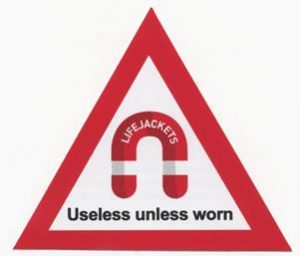Littlehampton Harbour actively supports the RNLI’s national drowning prevention campaign, Respect the Water. It highlights the risks, helps you avoid them and gives advice to keep you and those around you safe.
Respect the Water is at the heart of the RNLI’s prevention work, which is aimed at promoting safety advice to all who visit the coast. The RNLI wants us all to enjoy the water, but to also recognise its dangers and never underestimate its power. The campaign aims to show those most at risk the potential dangers of water, to encourage them to reconsider their actions and adopt safer behaviour.
Current drowning figures show a clear gender divide, with men accounting for over two-thirds of those who die. So the campaign is primarily aimed at men, particularly those aged between 16 and 39 years, who are more likely to take risks. Although the safety advice is just as relevant for anyone visiting the coast.
Fight your instinct, not the water: Around 190 people lose their lives at the UK and Irish coasts each year, and over half never even planned to enter the water. Respect the Water focuses on simple skills that could save a life:
- If you find yourself unexpectedly in the water, float to increase your chances of survival.
- If you see someone else in trouble in the water, call 999 or 112 and ask for the Coastguard.Cold water
Cold Water: Cold water shock is triggered in water temperatures lower than 15⁰C – the average temperature of UK and Irish waters is 12⁰C. So even in the Summer, the water temperature is cold enough to cause cold water shock, which can steal the air from your lungs and leave you helpless in seconds.
Fast Moving Water: Rip currents can travel up to the same speed as an Olympic swimmer (4.5mph) and can pull even the strongest swimmers out to sea. And unexpected waves can quickly knock people off their feet.
Together we can reduce coastal drowning and save more lives at sea!
What are we doing locally in our area?
Lifejacket Clinics: Our RNLI volunteer Community Safety Officer organises 3 to 4 Lifejacket Clinics each year (most often at Arun Yacht Club) where he can talk you through how to inspect your jacket for signs of wear and expired parts. During 2018 he looked at 70 jackets. 60% had expired parts and 8% would not have inflated. Are you confident about yours?
Public Events: The team is attending various public events across West Sussex to talk about the key Respect The Water messages
Safety Materials: Leaflets and tools designed for various user groups including yachting, dog walking, motorboating, kayaing etc have been distributed to the Harbour Office, clubs, shops and other key locations. These excellent tools include waterproof phone pouches, mayday cards, engine check lists and advice leaflets.
Targeted Interventions: Our biggest risk areas are being tackled with specific interventions. A recent example is dogs jumping down onto the shoal bank at the harbour entrance from the harbour wall near the West Beach car park. On average, the RNLI lifeboat launches 5 to 6 times per year to retrieve dogs stuck here to prevent their owners endangering themselves. The RNLI and the Harbour worked together to design a sign intended to highlight the danger and advice dog walkers what to do next when it goes wrong
Community Lifesaving Plan: Alongside the Littlehampton Harbour Stakeholder Group and other local safety and search and rescue agencies, the RNLI has developed a Community Lifesaving Plan for the Littlehampton Lifeboat Area which stretches from West Worthing to Bognor Regis. The plan assesses lifeboat launch and beach lifeguard incident data over the last several years, analyses the key risk areas and comes up with an action plan to help reduce preventable drowning in our area by 50% by 2024. If you would like to see or contribute to the further development or implementation of this plan, please contact harbour@littlehampton.org.uk or littlehampton@rnli.org.uk.



